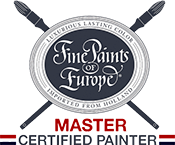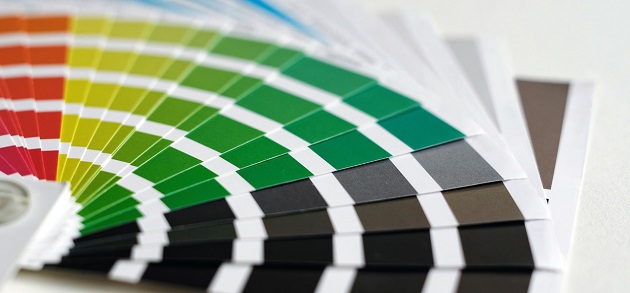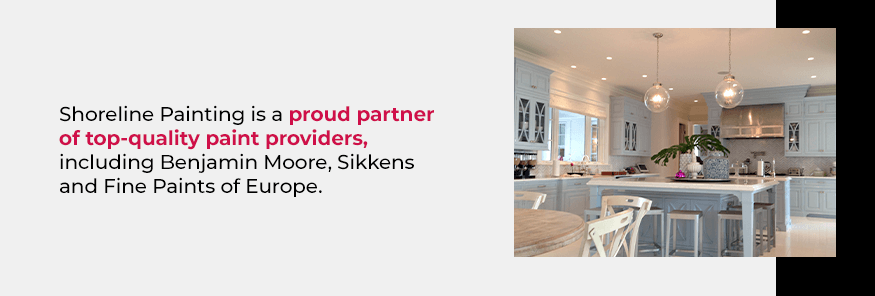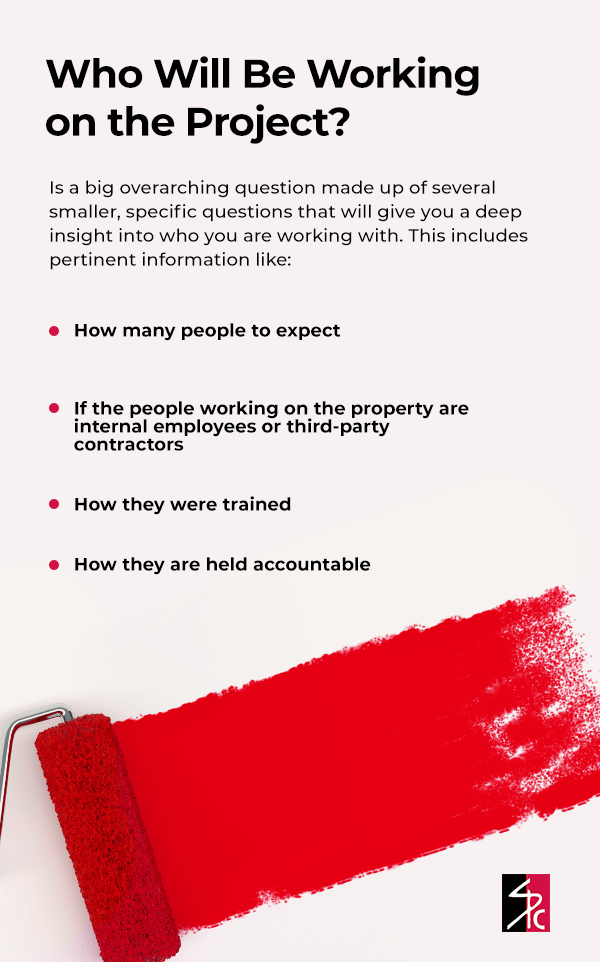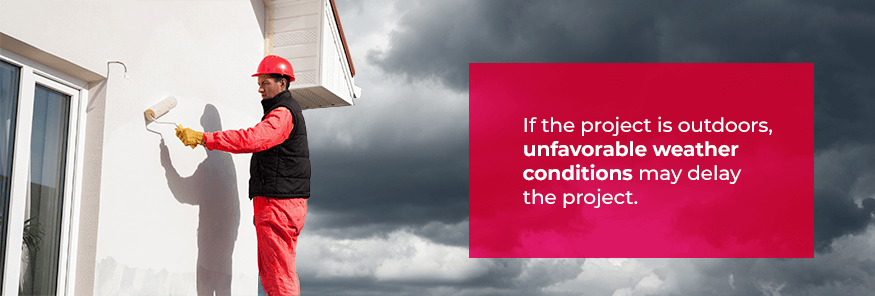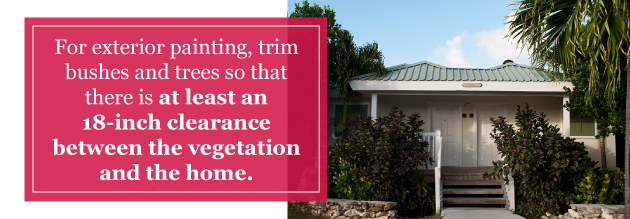Your Guide to Hiring a Painting Contractor
September 25, 2024
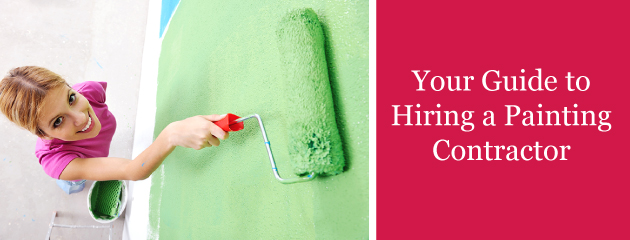
If it’s time to paint your home, you have an important decision to make between hiring a professional painter and doing the job by yourself. What are the benefits of a professional painter vs. a DIY job? Read through our complete guide for deciding if you need a professional painter and how to find the right one for you.
Should I Hire a Professional Painter?
Once you’ve decided that your home needs to be painted, whether it’s internal painting or external painting, it’s important to first determine whether you want to hire a painter or do it yourself. Some of the considerations are:
Precision and Accuracy of Paint Job
The truth is, an amateur paint job looks like an amateur paint job. If you try doing it yourself, you’ll inevitably end up with uneven painting in certain areas, missed spots, drips and other elements that will make it clear to everyone you did it yourself. A qualified professional painter prides themselves on precision. They have the right tools and expertise to paint a house to perfection, so it looks like a professionally painted home.
Time Saved From Having to Paint Things Yourself
Your time is valuable, and painting can be long, painstaking work. Why torture yourself for hours and possibly days to end up with a subpar paint job when you can have professionals do it quickly so it looks great without any extra effort by you?
Greater Expertise by Using a Pro Painter
Professional painters know things you don’t know, including the right paints to use, the right tools to apply them, and even the best safety precautions. There’s a reason they are called professionals.
Getting a Paint Job That Lasts
If you do your own paint job and it comes out poorly, you may end up having a professional redo it anyway, costing you money and time. Even if you’re somewhat satisfied with your work, a job by professionals is likely to last longer, meaning more time until your next paint job. In these ways, having a professional do the work can actually save you on some costs.
How to Hire a Painting Contractor
So you’ve decided that tackling a painting job is not on the plan for you. Since that’s the case, you’ll need to find a painter. However, without proper preparation, you can find yourself in a situation with an underqualified or low-quality contractor. A little bit of research can help you avoid common mistakes and know the right questions to ask.
Mistakes to Avoid When Hiring Painting Contractors
When choosing a painting contractor, you’ll want to look for candidates who are reputable and experienced. During this process, however, you may encounter many pitfalls you’ll want to avoid. We’ve outlined the top 10 mistakes we’ve seen our clients make in the past!
1. Not Choosing a Local Contractor
One of the most common mistakes homeowners make is to do a generic search for a painting contractor. You want to be sure you search for one in your area. They don’t have to be the next street over, but there are many benefits to choosing a local contractor who knows your town or region. First, it’s more convenient for you and them. They can quickly and easily come to your home and provide you with an estimate for your painting project. If you’re painting the exterior of your home, you want a local contractor who understands the weather conditions of your area and can deliver a high-quality paint job that will last season after season. Finally, a local painter is more likely to be able to work on your project every day and, if there’s an emergency, you know they can respond more quickly than a company located far away. Shoreline Painting is family-owned and has been in business for over 30 years. Our painters are experts in local trends and deliver world-class workmanship.
2. Going With the Cheapest Option
Often, the cheapest option is not the best one. More times than not, you get what you pay for, and the option that delivers the best results costs a bit more. Keep in mind that businesses that offer lower prices than their competitors may cut corners or overlook the details that ensure quality results. Additionally, companies offering incredibly low prices may be financially incapable of completing high-quality work if they can’t afford high-quality paint. Since the quality of the paint job can depend on the quality of the paint used, you want to make sure the contractor you choose uses high-quality paints and never cuts corners. Shoreline Painting offers competitive prices and exceptional craftsmanship.
3. Getting Only One Estimate
We understand the temptation to go with the first estimate you receive, especially if you’re in a rush to get a painting job done. However, if you just go with the first bid or estimate you get, you won’t know whether you’re being over- or undercharged for your project. While being undercharged may seem like a good thing, some contractors offer prices significantly lower than their competitors because they cut corners in one way or another. For example, they may not have the appropriate qualifications or experience, they may be using inferior materials, or the overall quality of their work may be substandard. We recommend getting estimates from at least two or three different painters so you can be sure you’re paying a fair rate for high-quality finishing.
4. Not Fully Communicating What You Want
This is one of the most common reasons that homeowners end up unsatisfied with the work of painting contractors. When describing your project to a contractor, you need to be as detailed and clear as possible about what you want. For instance, if the existing paint is bubbling and peeling or mold and mildew are growing, the painters need to know this so they can come prepared. If you want to paint the ceiling as well as the walls, expect a clear coat on the molding or want the caulking to be replaced, be sure you communicate those things, too. When our expertly trained painters come to your home for a free estimate, they come prepared with the right questions to ask to make sure that you’re thrilled with the final product.
5. Overlooking Insurance
If the painters you hire don’t provide workers’ compensation policies and general liability insurance, you will be responsible for any accident that occurs on your property during the project. Painting contractors that are insured can provide coverage for replacement, repairs and reimbursements for any damage that may occur to your property during the project. Workers’ compensation protects you from having to pay extra charges if anyone on the painting team gets injured while working on your home. Having insurance is critical, and a reputable painter will freely show you proof of the insurance policies they have.
6. Not Doing Enough Research on the Contractor Before You Hire Them
Researching is a key step in the hiring process and helps you ensure you’re hiring the best team for your project. Most homeowners, however, do not spend enough time on this part of the process. For example, let’s say you care a lot about how well the floor in your home is protected during your painting project. If so, find out what measures the company takes to protect your flooring from splatters and drips. If you do a little research on your prospective painting contractor or ask them questions, you can easily find these things out. At Shoreline Painting, we have a meticulous painting process to deliver the highest quality service and we will happily answer any questions you have about your painting project.
7. Choosing an Inexperienced Contractor
While a new business deserves an opportunity to prove itself, hiring a new painting company with no track record is taking a big risk. You will want to be certain that the painter you hire has sufficient experience painting different types of homes. If the company is new, they may not know what exterior and interior painting mistakes to avoid, such as when to use a primer or how long to wait between coats. You might feel better about using a newer company if the painters have extensive experience and can support the newly established company with their knowledge. Find out how experienced a painting contractor is by asking for testimonials or references.
8. Not Asking for Certifications or Licensing
When searching for a painting contractor to paint your home, you won’t want to pick just anyone. The state you live in may or may not require painters to be licensed to offer painting services. Whether a painter needs to be licensed also depends on where they work, so you might want to check your local regulations to see what requirements the painters must satisfy to paint your home legally. Whether they’re licensed or not, all painting companies must at least be registered with the state where they offer painting services.
9. Not Confirming Whether the Painter Can Deliver the Results You Want
If all you need is a coat of paint to be applied to drywall that has already been primed, you could hire just about any painter to perform that service. However, if your project is more complex, such as one that requires a faux finish, stripes, a high sheen on a perfectly smooth surface or a Venetian plaster texture, you need to find someone who has the right skills and training for the job so it is done perfectly the first time. To determine whether the painting company you’re considering can do this, be sure to discuss your vision and ask if they can achieve the look you want before you agree to anything.
10. Not Getting Your Contract in Writing
When hiring a painting contractor that matches your home needs the best, you will want to secure the contract in writing. Having a written contract provides you with certain legal protections when proceeding with the project. Without a written agreement, you risk losing that protection, especially in terms of insurance, which can come in the form of bodily injuries and property damages.
The contract should also contain many details about the project, including:
- The estimated amount of time the job will take
- The paint colors that will be used
- The payment and work schedule
- The materials required
Top Questions to Ask Professional Painters Before You Hire Them
After you narrow down the contractors to maybe half a dozen, you’ll want to ask them a number of questions to make sure that you pick the painter that is right for your needs. What are some considerations you should think of when looking to hire a painter, and what are the types of questions to ask a painter to determine their skill level for your job? At first glance, it might be hard to tell what company deserves your business. Knowing what questions to ask a professional painter can help distinguish between companies that might look similar at first glance. When you’re getting ready to hire a professional painter, it helps to have a list of questions prepared ahead of time to ask the painting contractor.
1. Is There Anything I Need to Do Before You Arrive?
Some painting companies don’t require their customers to do anything before the project starts, whereas others may request them to move furniture away from the job site or even do more extensive interior painting preparation such as removing outlet covers and light fixtures. Many painting companies are willing to move your furniture for a fee. Knowing what your contractor expects you to do ahead of time is a good idea for proper preparation and will help keep your project on time and on budget.
2. What Type of Preparation Work Will You Do?
Prep work is key to your project’s success, and knowing what the painting crew will do is important. You’ll want to be certain that the painting contractor you hire is not lowering costs by cutting out some critical steps from the project. For example, if the surface to be painted has nail holes or other imperfections, you will want to know whether the painter intends to make the necessary repairs or will just paint right over the problems. At Shoreline Painting, we handle all preparation work so you can be assured of the best quality finish. Our preparation includes protecting finished surfaces, filling holes, sanding and cleaning surfaces to ensure they are free of dust, dirt, mold and mildew.
3. What Will You Do to Ensure My House Stays Clean?
Painting is often a messy process. Additionally, accidents can happen, as with any home renovation project. Confirm that the painting contractor will clean all messes, and not leave you to clean up after them. Professional, trustworthy contractors will gladly provide details like these. At Shoreline Painting, we clean our work areas daily, whether that means dusting rooms or removing debris from yards, and at the end of a project.
4. What Products Will You Use?
The quality of primer and paint will have a major impact on the end quality of the project. Beware of companies trying to cut costs using inferior brands of paint. Despite what others may tell you, the quality of paint matters.
High-quality paint creates a more durable finish and a more even application of color. It looks nicer and lasts longer. Durability is particularly crucial for exterior painting. Quality paint protects your home from the elements. A durable finish will resist fading, cracking and peeling, boosting your curb appeal for years to come.
Shoreline Painting chooses quality products to give you the best results. Ask our professional painters what brands we recommend and why we stand by them. You can also ask our painting contractors for a color consultation. One of our knowledgeable consultants will provide you with options that best suit your home and style preferences. Brand and color shouldn’t be the only considerations, however.
Our professional painters at Shoreline Painting will note the special circumstances that apply to your paint job, such as:
- Whether the paint is for indoor or outdoor use
- The temperature and moisture levels the paint will be exposed to
- The surface that is being painted
Ask our painters what factors they’re accounting for and how it impacts the type of paint they’re choosing. They will proudly explain the benefits of their choice. When we select paint for your home, we account for key characteristics such as mold resistance, durability, ultraviolet radiation resistance and environmental friendliness.
Shoreline Painting is a proud partner of top-quality paint providers, including Benjamin Moore, Sikkens and Fine Paints of Europe. We are a Fine Paints of Europe Master Certified Painter.
Fine Paints of Europe only certifies professional painters referred by a local retailer who attend special training for the best application of their products and provide clients with quality work at a fair price. Fine Paints of Europe produces the finest interior paints for their clients. These paints are odorless, fast-drying and look beautiful for 10 years or more, significantly longer than other brands, and we’re proud to offer their products to our clients.
5. Can You Deal with Lead Paint?
If you have a home that is over 30 years old, you’ll need to ask your painter if they are familiar with dealing with lead paint. They will need to have the proper equipment and skills to ensure that you and their workers avoid exposure to particles of lead. If your home dates back to before 1978, chances are that it contains lead paint. Make sure that the painter knows the proper manner in which to collect dust from lead paint if they are doing any sanding. Sanding without using adequate filtering from a vacuum violates EPA and OSHA standards.
6. Are You a Certified and Insured Painter?
If the painter causes any damage to your home during the process of painting, you want to know that they will be able to pay for it. Verify that the painter has insurance by asking for a copy of their certificate. Once you’ve received a copy of the certificate, you can call the agent or insurance company to make sure that the insurance is current.
7. Who Will Be Working on the Project?
Who will be working on your project is a big overarching question made up of several smaller, specific questions that will give you a deep insight into who you are working with. This includes pertinent information like:
- How many people to expect: The number of people present is a good indicator of how long the task will take and the quality of the work that will be done. All else being equal, a fully staffed team will get more done in less time than three or fewer people. Shoreline Painting has a large team to ensure your project gets the attention it needs to be completed up to our rigorous standards and within your deadlines.
- If the people working on the property are internal employees or third-party contractors: Another important component of this question is if the company is using internal employees or subcontractors. Employees will generally have a more vested interest in the quality of your paint job than a third-party contractor. Long-term employees have an established relationship with the company. Employees who don’t represent their company well don’t tend to last long.
- How they were trained: Another reason outside contractors often provide lower-quality work is a lack of training. Companies have more control over the training of their own employees and can confidently attest to their skills and qualifications. At Shoreline Painting, our trained painters know how to inspect, prepare, prime and paint a variety of surfaces and materials.
- How they are held accountable: Shoreline Painting takes pride in our all-star staff that provides exceptional service and quality craftsmanship. We are fully bonded, licensed and insured, and our painters are skilled in all interior and exterior painting facets. They apply the same care and attention to detail on each job as if they were working in their own homes.
8. What Are Some Potential Complications That May Arise? How Will You Handle Them?
This question will evaluate a paint company’s ability to recognize and respond to complications. You want assurance that your painters are experienced and knowledgeable and that they’ll address any possible concerns with you as soon as they’re aware of them.
Our experienced painters at Shoreline Painting know how to handle any challenges that arise during the painting process. We may need to expand the project to address complications discovered during our thorough inspection and preparation processes.
We may need to do small carpentry repairs or wood replacement if we discover rot. For older homes, lead paint is another common concern. If your home was built prior to 1980, the exterior is likely covered with lead-based paint. Shoreline Painters is an EPA lead-safe certified firm. Allow our knowledgeable experts to handle your exterior paintwork to ensure the proper containment and recordkeeping protocols are followed to keep your family safe.
Another outside factor that can cause potential delays for exterior painting is unfavorable weather conditions. In addition to rain, excessive heat, cold, moisture or dryness can affect the quality of a paint job. We know better than to rush through a job when non-optimal conditions will impact the quality of the finished product. We’ll paint only when the circumstances are appropriate to give your property a smooth, durable finish that won’t bubble, peel or crack prematurely.
9. Who Do I Contact if I Have a Question or Problem?
Communication is key to a positive service experience, and painting is no exception. It is frustrating to have no point of contact when you have a question about the job after the start of the project.
A lack of communication isn’t a problem when you contract with Shoreline Painting. We built our business on exceptional customer service and will put your needs first. A job site supervisor, crew leader and general manager will be present throughout the duration of every project. In addition to ensuring that our paint finishes are smooth, seamless and clean, they are there to support you and answer any questions you may have during the process.
Even after the project is complete, we are available and easy to contact. We are a local business with a longstanding history of top-quality performance. We stand by our work. If something goes wrong, we’ll be there to fix it.
10. How Does the Painter Want Payment?
Sometimes, if the painter wants the entire payment prior to starting the job, that is an indication of a poorly run business. Furthermore, it doesn’t give you much leverage if you’re not satisfied with the final job. While it’s not unreasonable for the painter to expect some payment prior to starting the job, i.e. for materials, expecting payment in full is an indication that they’re cash-strapped and may not have a profitable business.
11. What Prices Do They Generally Charge?
If there is extensive preparation that is involved, make sure that is included in your quote. The quote should also include all materials used and have a reasonable estimate of the amount of paint to be used.
Read the contract carefully to avoid any surprises at the end of the job. If it’s a fixed-price contract, it should be for the actual cost of the project. Any extra costs, such as moving, should be included in the contracted price. The fixed-price contract is the most common and includes both material and labor costs.
The other type of contract is a time and materials contract, in which you’ll get billed for the hourly labor costs as well as the materials. Generally speaking, the fixed-price contract is preferable because you know exactly what you’ll be paying. Major points in the contract should focus on the exact areas to be painted, what preparation/cleanup the painter is doing, the manner in which the painter will protect your belongings, the length of time the project will take, and how the painter will be paid.
12. When Will You Be Working on the Project?
You’ll want to get a feel for the projected timeframe when choosing a painter for your home. This information includes dates the painters will be working, what times they will be working each day and how many days the job is expected to take. A routine schedule with clear start and stop times each day signifies a well-run and organized company.
Note that not all paint jobs will be completed on time. While most projects can be completed in less than five business days, some projects may take a little longer, particularly if they are large or complicated projects. There are outside factors that may extend the timeframe of a project, as well.
If the project is outdoors, unfavorable weather conditions may delay the project. Under such circumstances, your painter should be forthcoming about the delays. They should explain the cause and the steps they are taking to resolve the project while updating you on changes to the project timeline. That represents quality communication and a dedication to being upfront and honest with customers.
At Shoreline Painting, we hold ourselves to the highest standards. When you meet with our professionals for a free quote, we will provide you with an accurate price estimate and project timeline. You will know when we’ll show up, what we will do and when we will be finished. If weather conditions or other unforeseen circumstances impact the completion date, we will promptly notify you so you don’t have to worry about playing guessing games. Open and honest communication is one of our professional foundations.
13. Do You Have Customers Who Could Verify the Quality of Your Work?
While the questions above can help determine the quality of a professional painter, the most direct approach is to ask for proof of their performance. A company can say all the right things and still fail to deliver. Customer reviews are arguably the most reliable indicator of what you should expect from a company.
Shoreline Painting is a well-established company. Property owners across coastal New York and Connecticut have trusted us with their interior and exterior paint projects for over 45 years. We have a long list of raving fans who are happy to testify about the quality of our work and the professionalism of our team.
The only proof that might speak louder than satisfied customers is samples of completed work. You probably can’t walk door to door asking to inspect your neighbor’s paint and who did it for them, but our online project portfolio is the next best thing. View some of our exquisite completed works to get a sense of what we can do for your property.
What to Do After Hiring a Painting Contractor
As you’ve decided which painter to use, you’re now wondering what you should do to ensure that the painting process goes as smoothly as possible. Learning how to work with a painter and what to do before he starts his job will not only save you money on the prep work, it will also ensure that you and the painter are on the same page when deciding exactly what you’re looking for.
If you’re hiring an interior painter, one of the first steps they should do is prepare the walls. If you have holes in your walls, they will spackle them, and allow plenty of time for it to dry. Then sand it before the painting project begins. Also, they should make sure that they clean the walls very well paying close attention to those walls in the kitchen that may have greasy deposits on them, as grease will interfere with the adhesion properties of the paint.
Don’t forget to have them clean all of those spots that may sometimes get missed and accumulate dirt and dust. Spots such as those behind the toilet are a perfect example of this. Move things that may get in the painters’ way. Kitchens and bathrooms often have many knickknacks and moveable shelves.
Make sure they remember to remove the outlet covers and switch plate covers. Even if the painter won’t charge you extra for that, it will make their job a lot easier.
For exterior painting, trim bushes and trees so that there is at least an 18-inch clearance between the vegetation and the home. This will give the painters room to get close enough to the home to make their job quicker and allow them to do a better paint job. In addition, clean the gutters as well. Clearing debris away from the gutters means that the painters don’t need to spend their time and your money to do this especially if they are charging you by the hour.
If your painter doesn’t offer, ask him for a walk-through when the job is finished. He should be willing to do touch-ups without an additional fee, as long as the area needing a touch-up isn’t the result of you scraping a wall when you moved furniture back into place after the paint job was completed. Make sure that you’re looking at all areas and all levels of the walls, not just at those that are within your sight when standing up. Ask family members taller and shorter than you to do a walk-through as well. They may notice something that you missed.
Looking for Professionals to Paint Your Home? Contact Shoreline Painting
If you are considering hiring a painting contractor for your property in Fairfield County, Connecticut or Westchester County, New York, Shoreline Painting can help. Our professional painters are known for attention to detail and clean, quality work. We are happy to answer any questions you may have. A conversation with one of our painting contractors will make it clear that you are working with a skilled professional who is passionate about painting.
Contact us for a free color consultation and an accurate price estimate. See the difference an industry-leading painting company makes.
Recent Posts & Guides





